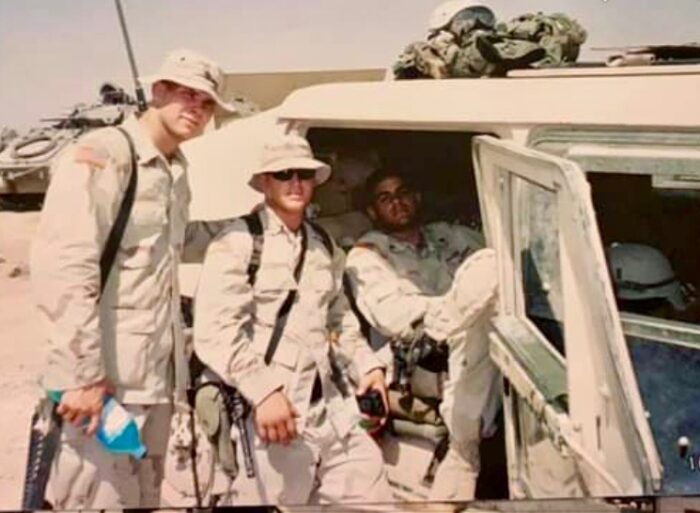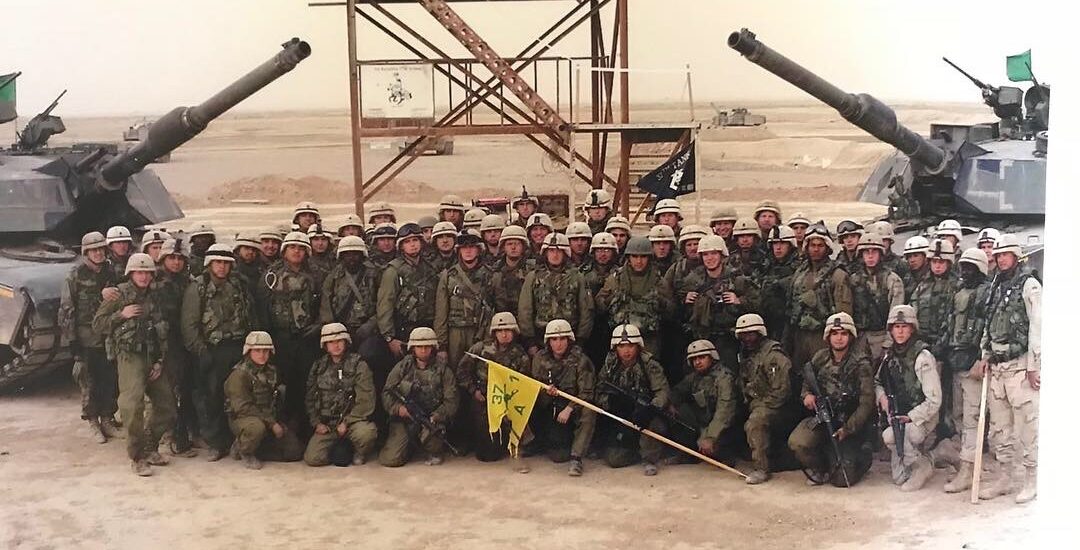Just a few years after driving a tank through the deserts of Iraq, I found myself sleeping on the side of a Texas highway, grappling with a body that felt like a stranger.
Twenty years ago, I joined the Army right after high school, intending to make it a lifelong career. But everything changed after returning from an overseas deployment.
I entered the Army motivated, eager, and ready to embrace the experience. In September of 2002, I joined as a tanker. Soon after arriving at my first duty station in Friedberg, Germany, with the First Armored Division, we received orders to deploy to Iraq as the conflict was beginning. Our field training immediately shifted to combat readiness.
We first landed in Kuwait, where I experienced my first taste of the Middle East desert heat and sandstorms. It was also my first time driving a tank outside of basic training. Maneuvering a seventy-ton steel monster with only a small vision block, no side view, and no rear visibility was nerve-racking. I knocked down sidewalks, light poles, and jerked the tank around while my tank commander cursed and yelled at me over the radio. When we finally reached our destination, Baghdad Island, I jumped out and threw up. That moment marked the beginning of our fifteen-month deployment.
Our new base had been a resort-style compound now reduced to rubble. We set up our home outside a parking lot and lived there for the first few months. We were constantly exposed to dust storms, burning jet fuel, explosives, and giant pits filled with trash and human waste, which are now known as toxic burn pits. As a new private, I was frequently assigned to these jobs.
During our deployment, we lived in trash and rodent-infested areas and encountered IED blasts, mortar rounds, snipers, and multiple firefights, especially toward the end of our deployment in Karbala.
After returning, I reported to my second duty station in Fort Knox, Kentucky. That is when I started noticing a decline in my health. In my early twenties and in top physical condition, I scored well on PT and even led soldiers who needed help meeting their PT and weight goals. Yet my body felt like it was falling apart.
Upon waking up, I began gasping for air. I felt exhausted all day and napped whenever I could. I had constant acid reflux and indigestion. My back injuries flared up, I rapidly gained weight around my belly, craved sweets and snacks, and lived in a continual state of anxiety and hyper-vigilance.
Medical providers ran labs and confirmed I had developed a cluster of metabolic disorders I had never even heard of at my age. Sleep apnea, acid reflux, arthritis, degenerative disk disease, elevated cholesterol, and the beginnings of diabetes. Honestly, I was shocked.
Unfortunately, I completed my service term and could not even reenlist. I was no longer thriving, was barely living, and I existed in a fog, groggy, out of my head, taking a cocktail of medications. I felt isolated and misunderstood, without my comrades or a purpose. Alcohol, poor sleep, and foods that did not work with my body made everything worse.
One day, in the middle of the afternoon while driving on I-10 in El Paso, Texas, I had to pull over and sleep on the side of the highway because I was driving unsafely. When I woke up, I realized I could not continue living that way. I decided to learn everything I could to take back my health and my life.
That decision led me to find nutrition therapy. So, I enrolled in a human nutrition and food science program with an emphasis on exercise physiology and sports nutrition. I learned what foods worked for my body and built a meal plan that aligned with my metabolism. I ate more lean proteins, vegetables, and fruits.
- My energy returned.
- My sleep improved.
- I lost stubborn belly fat and rebuilt muscle.
- My breathing improved, my symptoms lifted
- I exercised more, which helped me reverse my metabolic disorders.
- I kept my diabetes from progressing and put it into remission.
Then, I completed my dietetic internship in Seattle, became a registered dietitian, and later a diabetes specialist. I have stayed in remission ever since.
Over the years, I developed a five-step protocol that has helped thousands of patients and clients renew their energy, lower their blood sugar, lose stubborn fat, build lean muscle, get off medications, and put diabetes into remission.
We created Vanguard Metabolic Nutrition to bring these tools to everyone experiencing these symptoms, and especially for veteran and military communities who need them most.
Why Veterans Face Higher Metabolic Risks

Veterans and military members experience physical, environmental, and psychological stresses that most people never face. These unique exposures and demands place a heavy burden on the body and increase the risk for metabolic disorders, sleep problems, weight gain, chronic pain, diabetes, and mental health challenges.
Environmental Exposures During Service
Many veterans were exposed to dust storms, petrochemical fumes, mold, lead, burn pits, solvents, pesticides, and industrial pollution. These exposures disrupt hormones, increase inflammation, and affect long-term metabolic health.
TBI and Repeated Blast Exposure
Up to thirty-six percent of veterans report traumatic brain injuries. TBIs often result from explosions, vehicle collisions, concussive shockwaves, or firing large-caliber rounds like mortars and tank rounds. Research now shows that repeated blast exposure can damage both the brain and the gut, disrupting immunity and gut bacteria and affecting mood, sleep, inflammation, and blood sugar control.
Sleep Disruption
Sleep is the strongest predictor of quality of life for veterans. Nearly 80% report sleeping fewer than 7 hours per night. Years of disrupted sleep during service often continue long after leaving the military and contribute to cravings, weight gain, blood sugar swings, anxiety, and fatigue.
Chronic Pain
More than seventy-five percent of veterans live with chronic pain. Pain impacts sleep, movement, emotional well-being, and metabolic function. Many veterans juggle pain management while trying to maintain daily responsibilities, making it more difficult to stay physically active.
Mental Health Challenges
Depression, anxiety, and PTSD remain major concerns among veterans. These conditions elevate cortisol, increase inflammation, and disrupt metabolic health. They also make it more challenging to maintain consistent routines around food, sleep, and activity.
Loneliness and Social Isolation
Nearly sixty-six percent of veterans report loneliness. Even when surrounded by others, many feel disconnected after leaving the military. Loneliness is linked to higher cortisol levels, disrupted gut health, overeating, and poor cardiac health.
Food Insecurity and Alcohol Use
Almost forty percent of veterans experience food insecurity, which leads to irregular eating patterns and reliance on processed foods. Hazardous drinking affects more than forty percent and remains a significant concern in the veteran community. Many veterans turn to alcohol to cope with sleep problems, chronic pain, hypervigilance, isolation, and the emotional load of military service.
Alcohol is now recognized as a known toxin. Even small amounts increase inflammation, disrupt gut health, raise blood sugar, interfere with sleep, and worsen metabolic stability. It also increases the risk of several cancers, especially colon cancer, which is now strongly linked to both chronic inflammation and alcohol intake.
Veterans with multiple mental health conditions are more likely to drink at higher levels, and those patterns make metabolic recovery more difficult. Poor sleep, low energy, cravings, mood swings, weight gain, and gastrointestinal issues are all amplified by alcohol use.
Understanding how alcohol interacts with the body and learning healthier coping tools is a key part of long-term metabolic restoration and overall quality of life.
Why Veterans Are Resilient and Why We Built These Programs

Despite these challenges, veterans military show remarkable resilience. They have a deeper appreciation for life, personal strength, and the ability to work through challenging and near-impossible situations.
Veterans and military personnel take action when they understand what is happening in their bodies.
They also often prefer healthcare providers who understand their experiences, exposures, and the invisible injuries they carry. Many veterans live in rural or underserved areas where specialty care is limited. This is why telehealth has become such a valuable tool. It brings care to them rather than requiring long travel or navigating complex systems.
We built Vanguard Metabolic Nutrition to fill these gaps. We bring care directly to veterans through telehealth coaching, personalized nutrition plans, workshops, evidence-based supplement guidance, and programs that address blood sugar balance, gut health, inflammation, sleep, energy, and long-term metabolic resilience.
Our mission is to support veterans every step of the way and ensure no one is left behind on their journey of restoration and optimization.
Three Action Steps to Begin Restoring Your Metabolic Health
These steps are simple, effective, and rooted in what I have seen work with thousands of veterans. You do not have to overhaul your entire life. You just need to start rebuilding your rhythm, support your gut, and nourish your body with the right tools.
Action Step One: Begin Your Day With Light, Movement, and Clarity
How you start your morning sets the tone for your entire day. Veterans often wake up already depleted because of years of disrupted sleep, chronic stress, and constant hypervigilance. A healthy morning routine begins with three things.
Sunlight
Step outside for a few minutes of morning light. Even on cold or cloudy days, outdoor light directly influences your hormones, dopamine and reward system, circadian rhythm, and overall motivation.
Light physical activity
Simple movements like a walk, stretching, bodyweight exercises, or morning chores signal the brain and body to wake up, regulate blood sugar, and turn on energy pathways. Veterans who begin their day with movement consistently report better mood, better focus, and steadier energy.
Avoid falling into the virtual entertainment trap.
If the first thing you do when you wake up is scroll through social media or YouTube, you hand your attention to an algorithm designed to keep you hooked. It works like a slot machine, which gives random rewards to keep you chasing more. Starting your day this way kills motivation and makes everything else feel harder.
Use technology as a tool, not a distraction.
Set limits on entertainment and use it only after you have completed physical activity or essential tasks. Protect your attention. Protect your momentum.
Action Step Two: Rebuild Your Gut Health With Real Food
Your gut is connected to your brain, immune system, hormones, metabolism, and even your connective tissue. Veterans with blast exposure, TBI, chronic stress, disrupted sleep, antibiotics, and environmental toxins commonly develop gut inflammation and imbalances in gut bacteria.
Healing your gut begins with foods that nourish healthy bacteria and reduce inflammation.
Lean protein sources
Protein supports muscle repair, recovery, hormone balance, and stable blood sugar. Veterans often under-eat protein, which slows healing and increases cravings.
Examples include:
• chicken breast
• turkey
• beef
• pork
• eggs
• canned tuna or salmon
Probiotic rich foods
These help replenish healthy gut bacteria and support digestion, immunity, and mood.
Examples include:
• yogurt with live cultures
• kefir
• sauerkraut
• kimchi
• miso or tempeh
Prebiotic rich foods
These feed your good bacteria and help repair the gut lining.
Examples include:
• onions
• garlic
• oats
• bananas
• beans and legumes
Avoid highly processed foods that continue to fuel inflammatory bacteria and instead choose foods that promote the rebuilding and replication of healthy bacteria. As your gut heals, energy, sleep, cognition, appetite, muscle recovery, and chronic pain all begin to improve.
At Vanguard Metabolic Nutrition, we offer tailored menus, eating plans, and meal planning resources for veterans and military families that take into account exposures, injuries, stress patterns, and metabolic needs shaped by military service.

Action Step Three: Support Your Body With Evidence-Based Supplements
Veterans often carry injuries, exposures, and metabolic stressors that require targeted nutritional support. The proper nutrients can restore deficits, support healing, and help your metabolism function as it should. The three supplements below have strong research behind them for veterans.
Omega three fatty acids
Omega-3s reduce inflammation throughout the body. Veterans exposed to burn pits, petrochemical fumes, or repeated blast waves often have higher inflammatory loads. Omega-3s support brain recovery after TBI, protect immune function, and improve cardiovascular health. They support mood, memory, and focus.
Recent studies show that repeated blast exposure and concussive forces can disrupt immunity and alter gut bacteria. Omega-3s help support both brain and gut healing.
Magnesium
Magnesium deficiency is widespread among veterans. Stress, poor sleep, caffeine, alcohol use, chronic pain, and mission-based eating patterns all deplete magnesium. Low levels show up as anxiety, irritability, muscle cramps, insomnia, and fatigue.
Magnesium improves sleep, calms the nervous system, stabilizes blood sugar, and supports muscle recovery. Veterans managing PTSD, chronic pain, or metabolic disorders often notice significant improvements once magnesium stores are replenished.
Pharmaceutical-grade probiotics
Gut health affects mood, immunity, inflammation, and metabolism. Veterans often have disrupted gut bacteria due to antibiotics, stress, MREs, burn pit exposure, and petrochemical toxins.
Recent studies show that repeated blast exposure and TBI can damage the gut lining and change gut bacteria. This affects immune function and increases inflammation. Pharmaceutical-grade probiotics help restore balance, support digestion, stabilize mood, and strengthen the immune system.
They are invaluable for veterans and military members managing PTSD, anxiety, chronic pain, IBS, or blood sugar swings.

A Final Message for Veterans and Military
Many veterans and military personnel suffer from metabolic dysfunction, sleep problems, PTSD, anxiety, depression, chronic pain, and TBI. These issues shape daily life, energy, and overall well-being. But we also carry tremendous resilience, strength, and the ability to rebuild.
Vanguard Metabolic Nutrition exists to equip veterans with the tools, knowledge, and support to restore their metabolism, strengthen their health, and reclaim their lives.
Reminder: You are not broken. You are not alone. You are capable of more than you realize. And we are here to walk with you every step of the way.
Link to veteran resources page: HERE









